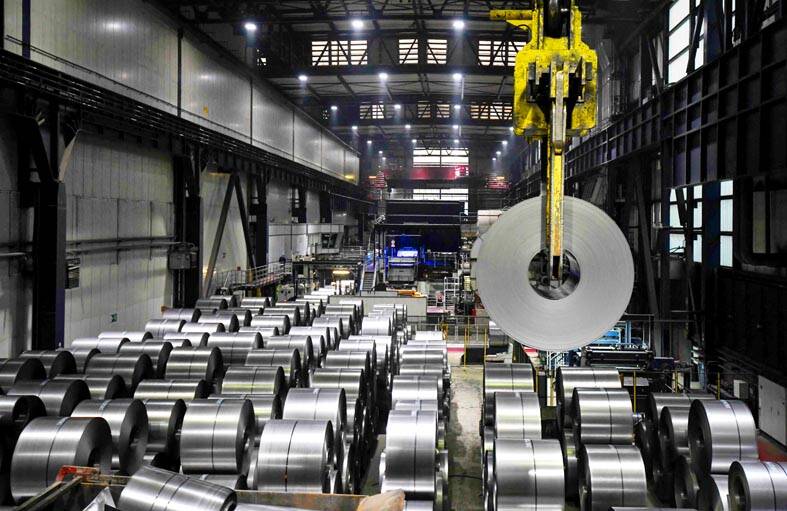The world’s biggest steel producer sounded the alarm about a crisis in China that carries the potential to send global shock waves, warning of a deeper industry downturn than major events in 2008 and 2015.
Conditions in China are like a “harsh winter” that would be “longer, colder and more difficult to endure than we expected,” China Baowu Steel Group Corp (寶武鋼鐵集團) chairman Hu Wangming (胡望明) told staff at the company’s half-year meeting.
For commodities including steel, the warning from Baowu underscores risks to demand and prices, as well as what ArcelorMittal SA, the No. 2 firm in the industry, called an “aggressive” surge of exports from China.

Photo: AFP
China’s steel market — by far the world’s largest — is flashing multiple warning signs as the protracted property downturn shows no signs of ending, while factory activity remains subdued. Baowu alone produces about 7 percent of the world’s steel, and its commentary is closely tracked to gauge the market mood in the Asian nation.
Hu’s stark message would likely be a worry for rivals across Asia, Europe and North America as they grapple with a fresh wave of Chinese exports, often by pushing for trade measures. Shipments from China are on track to reach about 100 million tonnes this year, the highest since 2016, as producers there scramble to offset a domestic slowdown.
German steel giant ThyssenKrupp AG yesterday highlighted the industry’s challenges by reporting a big slump in earnings. Earlier this month, ArcelorMittal said that China’s rising exports had put the global market in an “unsustainable” condition.
China’s steel industry experienced devastating slumps during the global financial crisis of 2008 and 2009, and again in 2015 and 2016. In both cases, the crises were ultimately resolved by massive stimulus — a prospect that looks more remote this year as Chinese President Xi Jinping (習近平) bids to reshape the economy.
Baowu did not offer much on the causes of the downturn, focusing on how employees should respond: by preserving cash and minimizing risks.
“Financial departments at all levels should pay more attention to the security of the company’s funding,” with a need to strengthen controls, including for overdue payments and detecting fake trades, the statement said.
“In the process of crossing the long and harsh winter, cash is more important than profit,” it said.

Nvidia Corp chief executive officer Jensen Huang (黃仁勳) on Monday introduced the company’s latest supercomputer platform, featuring six new chips made by Taiwan Semiconductor Manufacturing Co (TSMC, 台積電), saying that it is now “in full production.” “If Vera Rubin is going to be in time for this year, it must be in production by now, and so, today I can tell you that Vera Rubin is in full production,” Huang said during his keynote speech at CES in Las Vegas. The rollout of six concurrent chips for Vera Rubin — the company’s next-generation artificial intelligence (AI) computing platform — marks a strategic

Shares in Taiwan closed at a new high yesterday, the first trading day of the new year, as contract chipmaker Taiwan Semiconductor Manufacturing Co (TSMC, 台積電) continued to break records amid an artificial intelligence (AI) boom, dealers said. The TAIEX closed up 386.21 points, or 1.33 percent, at 29,349.81, with turnover totaling NT$648.844 billion (US$20.65 billion). “Judging from a stronger Taiwan dollar against the US dollar, I think foreign institutional investors returned from the holidays and brought funds into the local market,” Concord Securities Co (康和證券) analyst Kerry Huang (黃志祺) said. “Foreign investors just rebuilt their positions with TSMC as their top target,

REVENUE PERFORMANCE: Cloud and network products, and electronic components saw strong increases, while smart consumer electronics and computing products fell Hon Hai Precision Industry Co (鴻海精密) yesterday posted 26.51 percent quarterly growth in revenue for last quarter to NT$2.6 trillion (US$82.44 billion), the strongest on record for the period and above expectations, but the company forecast a slight revenue dip this quarter due to seasonal factors. On an annual basis, revenue last quarter grew 22.07 percent, the company said. Analysts on average estimated about NT$2.4 trillion increase. Hon Hai, which assembles servers for Nvidia Corp and iPhones for Apple Inc, is expanding its capacity in the US, adding artificial intelligence (AI) server production in Wisconsin and Texas, where it operates established campuses. This

US President Donald Trump on Friday blocked US photonics firm HieFo Corp’s US$3 million acquisition of assets in New Jersey-based aerospace and defense specialist Emcore Corp, citing national security and China-related concerns. In an order released by the White House, Trump said HieFo was “controlled by a citizen of the People’s Republic of China” and that its 2024 acquisition of Emcore’s businesses led the US president to believe that it might “take action that threatens to impair the national security of the United States.” The order did not name the person or detail Trump’s concerns. “The Transaction is hereby prohibited,”